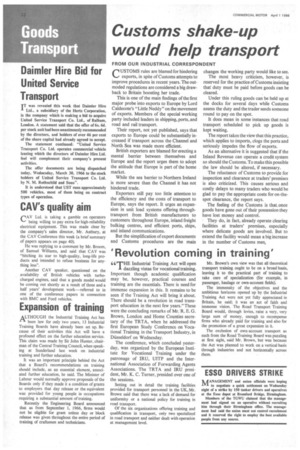Revolution coming in training
Page 24

If you've noticed an error in this article please click here to report it so we can fix it.
44 • • HE Industrial Training Act will open dazzling vistas for vocational training. Important though academic qualification may be, however, practical courses and training are the essentials. There is need for immense expansion in this. It remains to be seen if the Training Act will bring it about. There should be a revolution in road transport education in the next few years." These were the concluding remarks of Mr. R. E. G. Brown, London and Home Counties secretary of the TRTA, when he addressed the first European Study Conference on Vocational Training in the Transport Industry, in Dusseldorf on Wednesday.
The conference, which concluded yesterday, was organized by the European Institute for Vocational Training under the patronage of IRU, U1TP and the International Association of Forwarding Agents Associations. The TRTA and IRU president, Mr. K. C. Turner, presided over one of the sessions.
Setting out in detail the training facilities provided for transport personnel in the UK, Mr. Brown said that there was a lack of demand for uniformity or a national policy for training in road transport.
Of the six organizations offering training and qualification in transport, only two specialized in road transport and neither dealt with operation at management level.
Mr. Brown's own view was that all theoretical transport training ought to be on a broad basis, leaving it to the practical part of training to take care of specialization (for example, in passenger, haulage or own-account fields).
The immensity of the objectives and the ambitious horizons opened up by the Industrial Training Act were not yet fully appreciated in Britain, he said; it was an act of faith and immense vision. The Road Transport Training Board would, through levies, raise a very, very large sum of money, enough to recompense firms who already paid for training and also for the promotion of a great expansion in it.
The exclusion of own-account transport as such from the Road Training Board was puzzling at first sight, said Mr. Brown, but was because the Act was planned to work on a vertical basis through industries and not horizontally across them.




















































































































